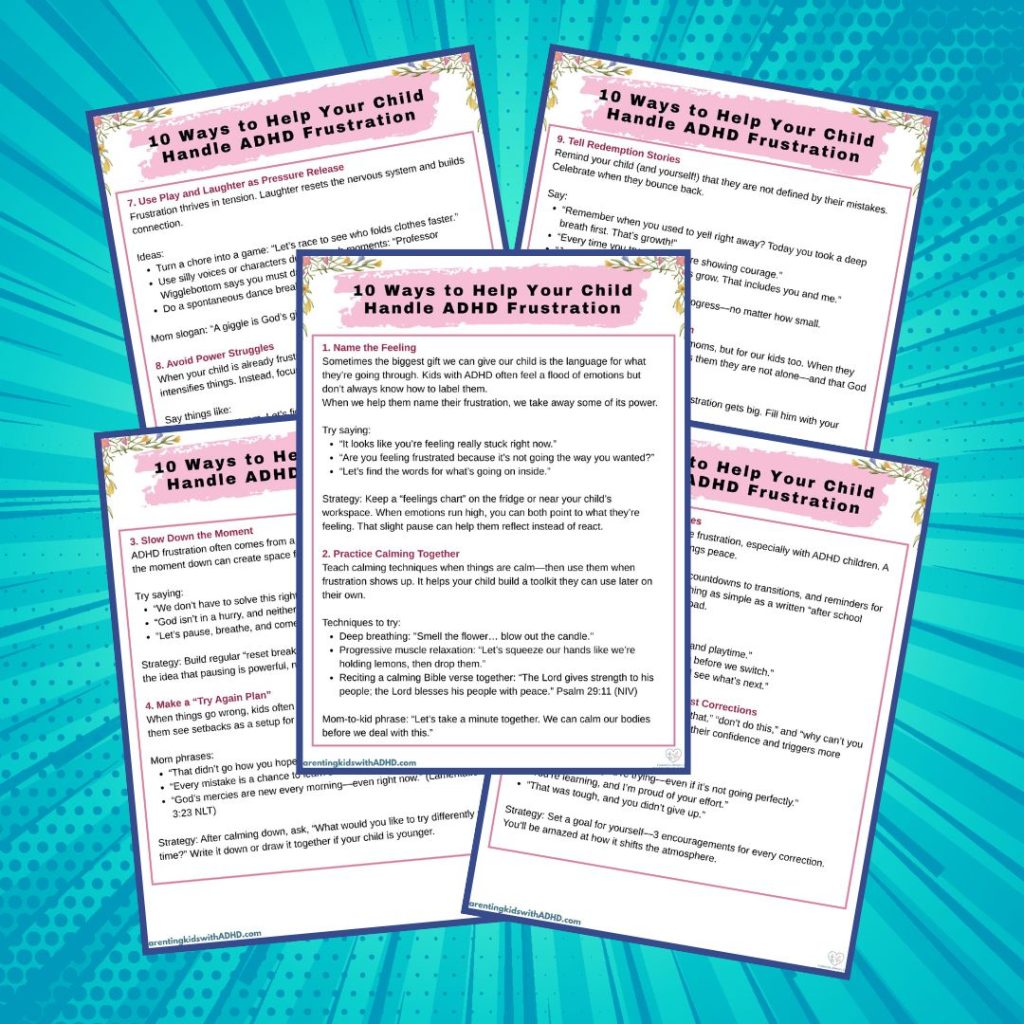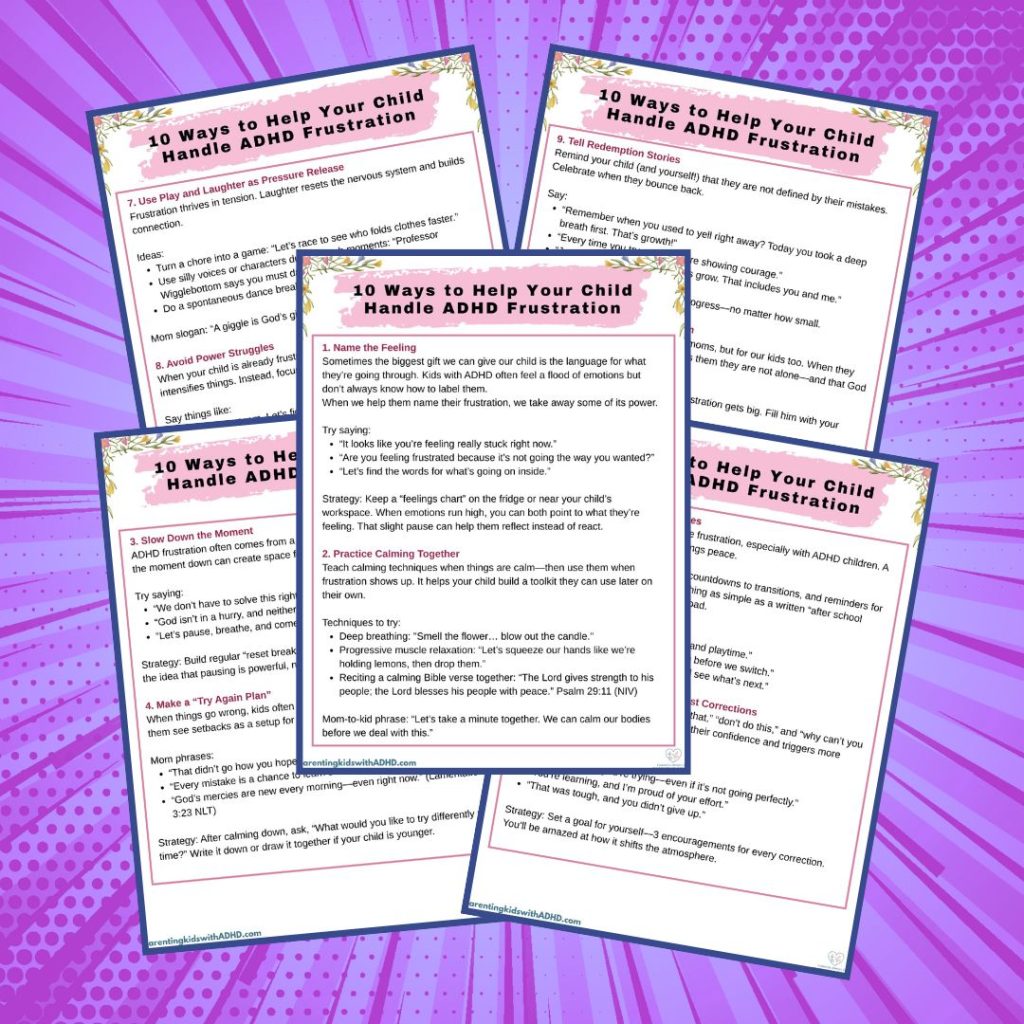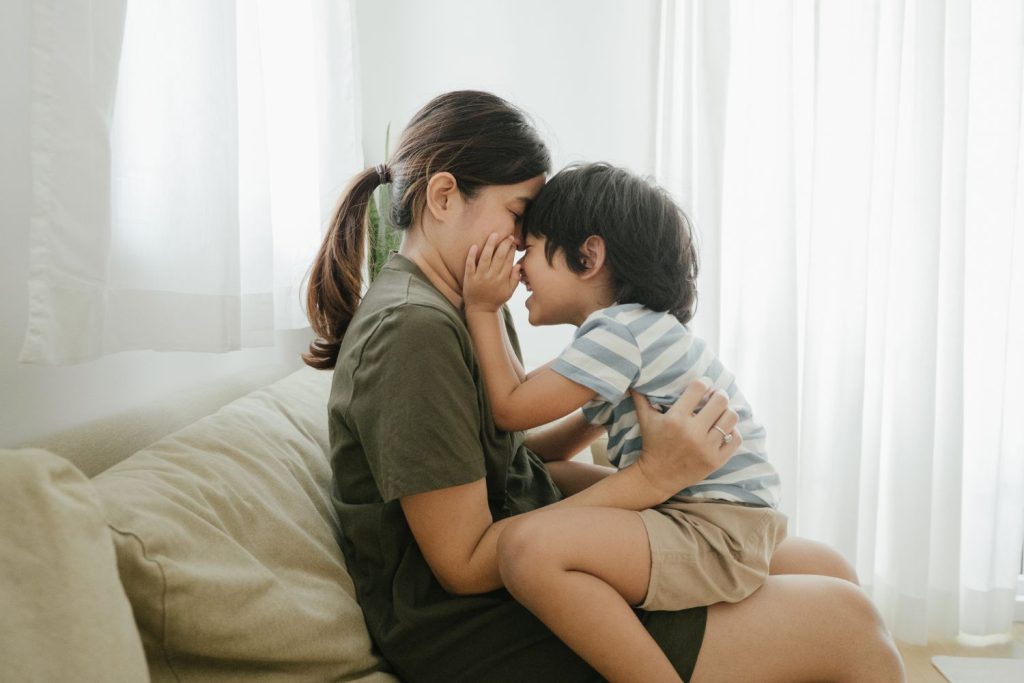10 Best Ways to Help Your Child Handle ADHD Frustration


Introduction
As moms raising children with ADHD, we see how quickly ADHD frustration can flare up over things that seem small to others—like a broken pencil, a tricky math problem, or a game that didn’t go their way.
For our kids, these aren’t just minor bumps in the road. Their ADHD brains are wired to feel things more intensely, and they rarely have the internal brakes to slow those emotions down.
That is where ADHD frustration management comes in, and we may need to teach our kids how to deal with ADHD frustration. This starts with recognizing the frustration is (mainly) caused by ADHD.
For me, it was only after the diagnosis that I realized the connection between ADHD and frustration. Prior to that, I just thought my son easily gave up, and I felt overwhelmed and had no clue how to help him.
But here’s the good news: just like we are being shaped by God’s grace, our children can grow in patience and resilience too. Frustration tolerance is a skill—and with the right tools, love, and faith, we can help them build it day by day.
It is possible to manage ADHD child frustration. In this blog we’ll have a look at what is the link between ADHD and frustration (and ours!), and the ways to deal with it. I will share 10 practical ways of ADHD frustration management.
And… I created an easy printable will all the 10 ways to help your ADHD child overcome frustration. Just scroll down to the end and grab yours!
How Do You Deal with ADHD Frustration?
This post may contain affiliate links; at no extra cost for you, I get a small commission. Read our full disclosure here or in our privacy policy.
When an ADHD child gets frustrated, it’s because their world feels out of sync.
Their brain is wired to process things differently—slower in some areas, faster in others.
When a task feels too hard, a rule feels unfair, or their body just won’t cooperate, it doesn’t take much for frustration to boil over. What might seem like a minor issue to us can feel massive to them. Their threshold for stress is often lower and their coping tools are still under construction.
They aren’t doing it on purpose. That’s one of the vital things ADHD kids wish we (parents) knew.
When my son was little, we experienced frequent ADHD frustration crying—but initially we didn’t understand it and felt unable to change it. Over time, I understood we need to help our kids with ADHD frustration management.
They’re not trying to be difficult. Their frustration comes from feeling stuck, misunderstood, or incapable—and that can be terrifying for a child. Especially when they want so badly to do well, to please you, or to just feel “normal.”
That’s why our response matters so much.
Not fixing, not scolding—but seeing.
Slowing down, softening our voice, and choosing compassion in those moments teaches them something their ADHD brain needs: that frustration doesn’t mean failure, and big feelings don’t make them bad.
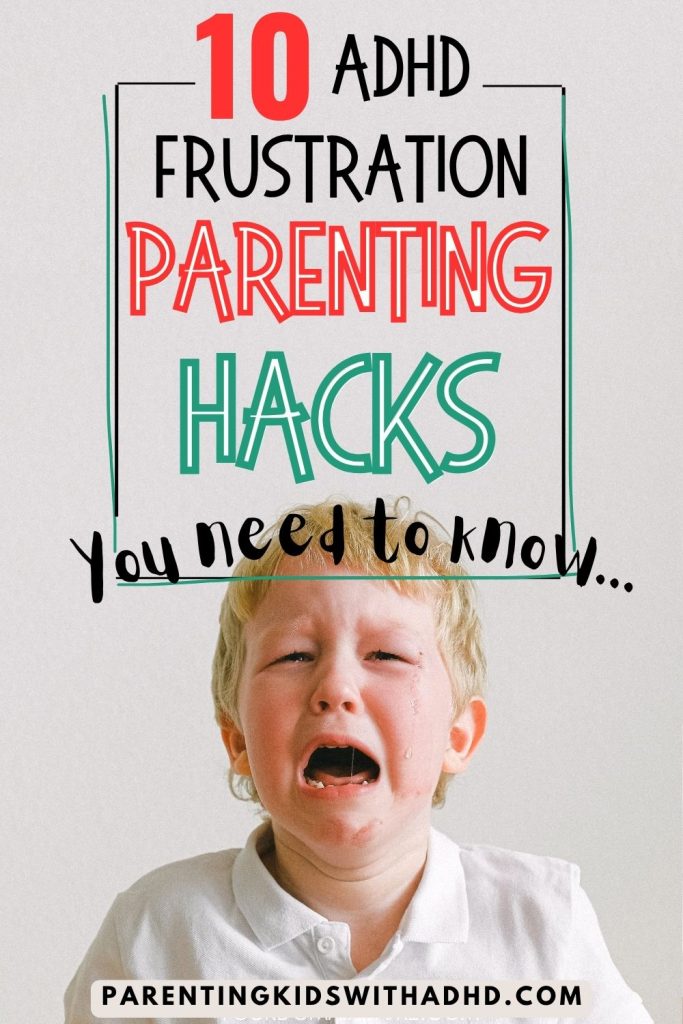
PIN ME FOR LATER!
When we stay steady, we become their anchor.
And over time, that anchor becomes a safe place for them to return to—again and again—as they learn to ride the waves of their own emotions. They need us to believe in them, especially when they’re falling apart.
Isn’t that just how Jesus loves us? Not when we have it all together, but right in the middle of our mess.
So when your child is melting down or lashing out or crying because they can’t get it “right,” remember: this is a moment of ministry. Not perfection, just presence. Not solutions, but safety.
And in those moments, you’re not just parenting—you’re planting seeds of resilience, security, and deep, lasting love. You help them learn how to deal with ADHD and frustration.
And let’s be honest—our kids aren’t the only ones who wrestle with frustration. We do too.
How do we ourselves deal with frustration with ADHD child?
Sometimes their outbursts wear us thin. Sometimes we feel like we’re walking on eggshells. And sometimes, we don’t like how we respond in the heat of the moment.
But we thank God there is a way for ADHD and dealing with frustration.
So how do we, as Christian moms, deal with ADHD frustration?
First, we start by giving ourselves grace.
Frustration is a very human response. Even Moses got frustrated with God’s people. Even Jesus sighed deeply when people didn’t understand. What matters is not whether we feel frustrated, but whether we stay there.
Pray before you react. When you feel your fuse getting short, whisper a quick prayer—even in your heart. “Jesus, help me respond with love right now.” “Holy Spirit, fill my mouth with kindness and my heart with patience.”
Even if the situation is chaotic, God is still present. Invite Him into that moment.
Pause instead of pounce. You can say something like:
- “I need a second to calm myself before we talk.”
- “I love you too much to respond in anger right now.”
- “Let’s both take a break and then come back to this.”
Modeling emotional regulation doesn’t mean we get it perfect—it means we’re humble enough to show the way, not force the way. Besides helping ourselves, we teach our ADHD children how to manage their frustration.
Let your child see you repair. If you do lose it (and we all do), own it. That doesn’t make you weak—it makes you trustworthy.
Try saying:
- “I was really frustrated earlier and I shouted. That wasn’t okay. I’m sorry.”
- “You’re not the problem—my reaction was. Let’s work together next time.”
This teaches your child that ADHD frustration doesn’t have to break connection.
Journal your wins and losses. Some days feel like a blur of hard moments. At the end of the day, jot down one thing you handled better than yesterday. Even if it’s small, it counts. God is growing you too.
And most importantly, stay rooted in God’s truth.
“My grace is sufficient for you, for my power is made perfect in weakness.”
2 Corinthians 12:9 (NIV)
Your strength isn’t in how calm you are or how smooth the day goes. Your strength is in Christ.
So when ADHD frustration hits hard—breathe, pray, pause, repair, and remember: you are not alone.
God sees your heart, and He’s equipping you with everything you need, one day at a time.
Let’s look at 10 tried tips on how to help our kids deal with ADHD frustration.
Wish you had someone who gets it? Someone who understands the meltdowns, the misjudgments, the mom-guilt?
That’s why I became a parenting coach for moms of ADHD kids. Let’s connect and create a new way forward—with grace, strength, and Jesus at the center.

10 Tips how to deal with ADHD frustration
I still remember the day I crumpled in the kitchen, tears in my eyes after another hard morning. My son had gotten frustrated over a pair of socks—yes, socks!—and the meltdown that followed left us both drained.
I had tried everything I knew, but his anger felt so big, so intense… and honestly, so confusing. I whispered, “God, what do I do with this? How do I help him without losing myself in the process?” If you’ve ever felt that too, friend—you are not alone.
ADHD frustration isn’t just about anger or tantrums. It’s often the result of real brain-based challenges—impulsivity, poor emotional regulation, sensory sensitivity, and feeling constantly misunderstood.
Our kids feel things deeply, but they don’t always have the skills to express those feelings in safe ways. That’s where we come in—not as perfect parents, but as Spirit-led guides.
Below are 10 practical, grace-filled strategies to help you walk through ADHD frustration with your child, instead of against them.
Keep a few of these phrases and ideas in your back pocket—you’ll be amazed at how they soften moments that once felt impossible. And as bonus… you feel more relaxed and will stop feeling like a bad mom.
Remember to download your free printable (Pdf) at the end of this blog.
1. Name the Feeling
Sometimes the biggest gift we can give our child is the language for what they’re going through. Kids with ADHD often feel a flood of emotions but don’t always know how to label them.
When we help them name their frustration, we take away some of its power.
Try saying:
- “It looks like you’re feeling really stuck right now.”
- “Are you feeling frustrated because it’s not going the way you wanted?”
- “Let’s find the words for what’s going on inside.”
Strategy: Keep a “feelings chart” on the fridge or near your child’s workspace. When emotions run high, you can both point to what they’re feeling. That slight pause can help them reflect instead of react.
2. Practice Calming Together
Teach calming techniques when things are calm—then use them when frustration shows up. It helps your child build a toolkit they can use later on their own.
Techniques to try:
- Deep breathing: “Smell the flower… blow out the candle.”
- Progressive muscle relaxation: “Let’s squeeze our hands like we’re holding lemons, then drop them.”
- Reciting a calming Bible verse together: “The Lord gives strength to his people; the Lord blesses his people with peace.” Psalm 29:11 (NIV)
Mom-to-kid phrase: “Let’s take a minute together. We can calm our bodies before we deal with this.”
3. Slow Down the Moment
ADHD frustration often comes from a sense of urgency or pressure. Slowing the moment down can create space for a better response.
Try saying:
- “We don’t have to solve this right now. Let’s take five minutes.”
- “God isn’t in a hurry, and neither are we.”
- “Let’s pause, breathe, and come back to it.”
Strategy: Build regular “reset breaks” into the day so your child gets used to the idea that pausing is powerful, not shameful.
4. Make a “Try Again Plan”
When things go wrong, kids often feel like that’s the end of the story. Help them see setbacks as a setup for a comeback.
Mom phrases:
- “That didn’t go how you hoped. Let’s make a new plan.”
- “Every mistake is a chance to learn something.”
- “God’s mercies are new every morning—even right now.” (Lamentations 3:23 NLT)
Strategy: After calming down, ask, “What would you like to try differently next time?” Write it down or draw it together if your child is younger.
5. Create Predictable Routines
Uncertainty and surprises spike frustration, especially with ADHD children. A predictable rhythm, instead, brings peace.
Mom tip: Use visual schedules, countdowns to transitions, and reminders for what’s coming next. Even something as simple as a written “after school routine” can ease the emotional load.
Phrases to use:
- “First homework, then a snack and playtime.”
- “I’ll give you a 5-minute warning before we switch.”
- “Let’s check your daily chart and see what’s next.”
6. Use Encouraging Words, Not Just Corrections
ADHD kids often hear a LOT of “stop that,” “don’t do this,” and “why can’t you just…?” Over time, that chips away at their confidence and triggers more frustration.
Instead, try:
- “I see how hard you’re trying—even if it’s not going perfectly.”
- “You’re learning, and I’m proud of your effort.”
- “That was tough, and you didn’t give up.”
Strategy: Set a goal for yourself—3 encouragements for every correction. You’ll be amazed at how it shifts the atmosphere.
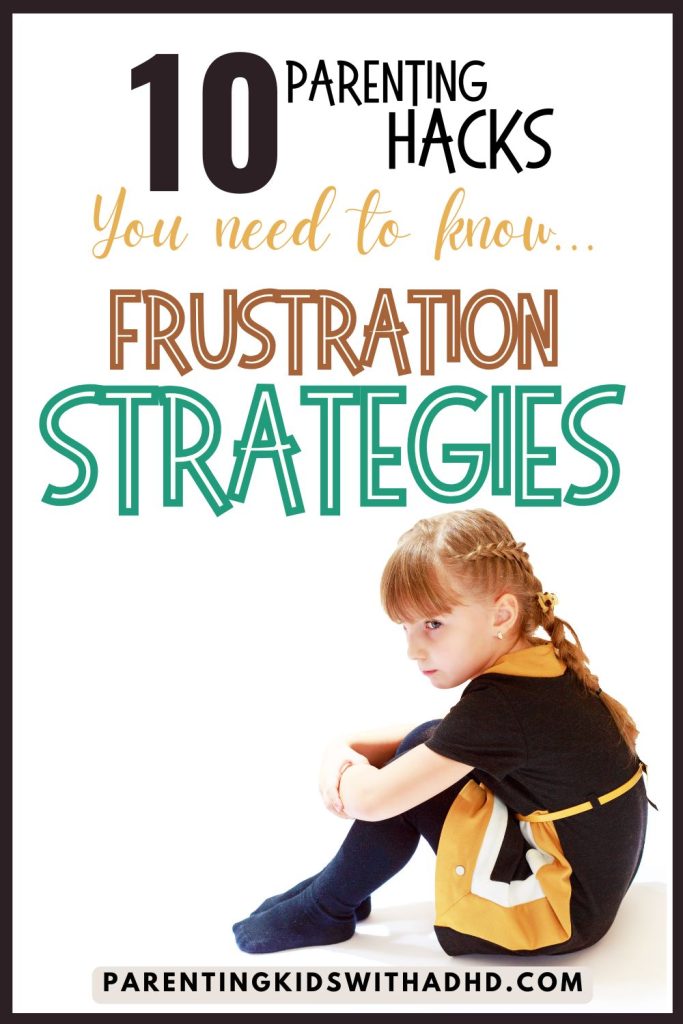
PIN ME FOR LATER!
7. Use Play and Laughter as Pressure Release
Frustration thrives in tension. Laughter resets the nervous system and builds connection.
Ideas:
- Turn a chore into a game: “Let’s race to see who folds clothes faster.”
- Use silly voices or characters during tough moments: “Professor Wigglebottom says you must dance before math!”
- Do a spontaneous dance break to shake off the stress.
Mom slogan: “A giggle is God’s gift in the middle of a meltdown.”
8. Avoid Power Struggles
When your child is already frustrated, trying to “win” the moment only intensifies things. Instead, focus on calming and connection.
Say things like:
- “I’m on your team. Let’s figure this out together.”
- “We can talk more when we both feel calmer.”
- “It’s okay to take a break. I’m not mad. I’m here when you’re ready.”
Strategy: Have a “calm corner” or “peace place” they can go to when things get too much, with sensory tools, Scripture cards, or a favorite stuffed toy.
Power struggles tend to become worse when kids get older. That’s why it is important to deal with it when they are young (if possible). Also, because ADHD appears differently from age to age.
9. Tell Redemption Stories
Remind your child (and yourself!) that they are not defined by their mistakes. Celebrate when they bounce back.
Say:
- “Remember when you used to yell right away? Today you took a deep breath first. That’s growth!”
- “Every time you try again, you’re showing courage.”
- “Jesus forgives us and helps us grow. That includes you and me.”
Tip: End hard days with stories of progress—no matter how small.
10. Pray With Them and Over Them
Prayer is powerful. Not just for us as moms, but for our kids too. When they hear us pray for their peace, it reminds them they are not alone—and that God is always at work.
We can pray effectively over our ADHD kiddos.
Pray out loud:
- “Jesus, help [child’s name] when frustration gets big. Fill him with your peace and patience.”
- “Lord, thank you that you made my child wonderfully and fearfully. Help him see his strength in You.”
Verses to speak over them:
- “Be still, and know that I am God.” Psalm 46:10 (ESV)
- “But the fruit of the Spirit is… patience, kindness, self-control…” Galatians 5:22-23 (NIV)
The Bible is full of Bible verses you can speak over your ADHD child.
Helping your child build ADHD frustration tolerance won’t happen overnight. But every time you pause, connect, and gently guide them through a hard moment, you’re planting seeds of resilience.
You’re modeling what it means to depend on God in the storm.
And mama, don’t forget—you’re learning too. God is building your patience as you help your child build theirs. You are not failing. You are being faithful.
“Let us not grow weary of doing good, for in due season we will reap, if we do not give up.”
Galatians 6:9 (ESV)
Takeaway ADHD and Frustration
ADHD frustration is part of the ADHD journey—for our kids and for us. But it doesn’t have to be something we fear.
We also don’t have to fear frustration with ADHD child, because with the right tools, a lot of grace, and God’s steady hand, frustration can become a doorway to deeper connection, stronger emotional skills, and a more peaceful home.
Mama, you’re not expected to get it right every time.
What matters is showing up, staying present, and choosing love—even when it’s hard. The more we practice calm, model grace, and walk in patience, the more our kids learn that big emotions aren’t something to hide—they’re something to handle, together.
I hope the 10 ways to manage your child’s ADHD frustration will be a blessing for you, as you are on your ADHD parenting journey.
Let this truth encourage your heart today:
“The Lord gives strength to his people; the Lord blesses his people with peace.”Psalm 29:11 (NIV)
You are equipped. You are not alone. And with God by your side, you are doing holy, beautiful work—one hard moment at a time.
Disclaimer
Everything shared in this blog is based on my personal experience, ADHD parenting training, and as a certified, ICF-credentialed life coach. I am not a medical doctor, psychologist, or licensed therapist. The content is for informational and encouragement purposes only and should not be considered medical or mental health advice.
If you suspect your child may have ADHD or any other medical condition, please consult with a qualified healthcare provider, such as a clinical psychologist, pediatrician, or psychiatrist, for an official assessment and diagnosis.
I specialize in coaching Christian moms who are raising kids with ADHD—helping you parent with grace, confidence, and faith. If you’d like personalized support, feel free to reach out and learn more about how I can walk this journey with you.

